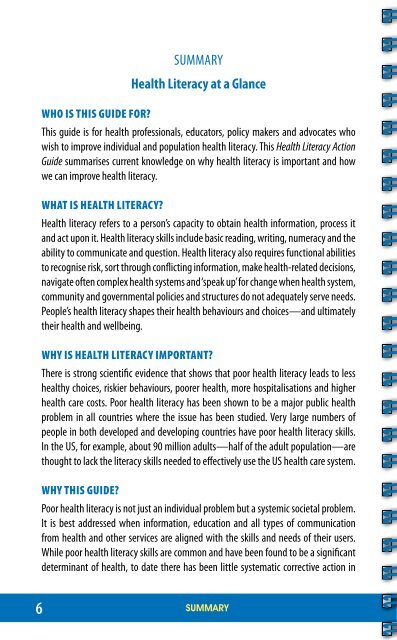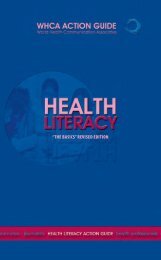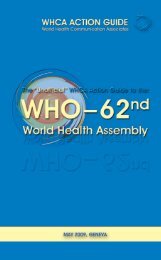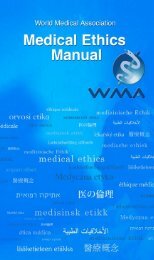Part 1 'the basics' - World Health Communication Associates
Part 1 'the basics' - World Health Communication Associates
Part 1 'the basics' - World Health Communication Associates
Create successful ePaper yourself
Turn your PDF publications into a flip-book with our unique Google optimized e-Paper software.
6<br />
Who is this guide for?<br />
SUMMARy<br />
<strong>Health</strong> Literacy at a Glance<br />
This guide is for health professionals, educators, policy makers and advocates who<br />
wish to improve individual and population health literacy. This <strong>Health</strong> Literacy Action<br />
Guide summarises current knowledge on why health literacy is important and how<br />
we can improve health literacy.<br />
What is health literac y?<br />
<strong>Health</strong> literacy refers to a person’s capacity to obtain health information, process it<br />
and act upon it. <strong>Health</strong> literacy skills include basic reading, writing, numeracy and the<br />
ability to communicate and question. <strong>Health</strong> literacy also requires functional abilities<br />
to recognise risk, sort through conflicting information, make health-related decisions,<br />
navigate often complex health systems and ‘speak up’ for change when health system,<br />
community and governmental policies and structures do not adequately serve needs.<br />
People’s health literacy shapes their health behaviours and choices—and ultimately<br />
their health and wellbeing.<br />
Why is health literacy imPortant?<br />
There is strong scientific evidence that shows that poor health literacy leads to less<br />
healthy choices, riskier behaviours, poorer health, more hospitalisations and higher<br />
health care costs. Poor health literacy has been shown to be a major public health<br />
problem in all countries where the issue has been studied. Very large numbers of<br />
people in both developed and developing countries have poor health literacy skills.<br />
In the US, for example, about 90 million adults—half of the adult population—are<br />
thought to lack the literacy skills needed to effectively use the US health care system.<br />
Why this guide?<br />
Poor health literacy is not just an individual problem but a systemic societal problem.<br />
It is best addressed when information, education and all types of communication<br />
from health and other services are aligned with the skills and needs of their users.<br />
While poor health literacy skills are common and have been found to be a significant<br />
determinant of health, to date there has been little systematic corrective action in<br />
Summary






